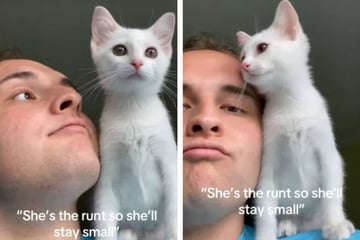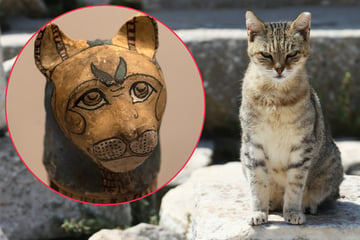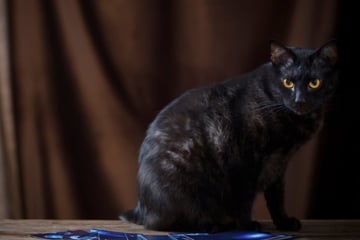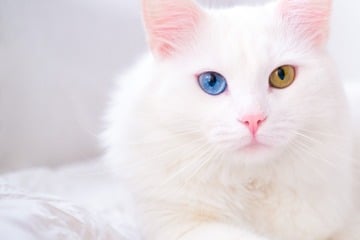Cats and babies: Dangers, considerations, and coexistence
So you've got endless love for both your fur baby and your real baby – what measures that you should be taking to make sure they can co-exist together peacefully? Here's all you need to know about cats and babies.
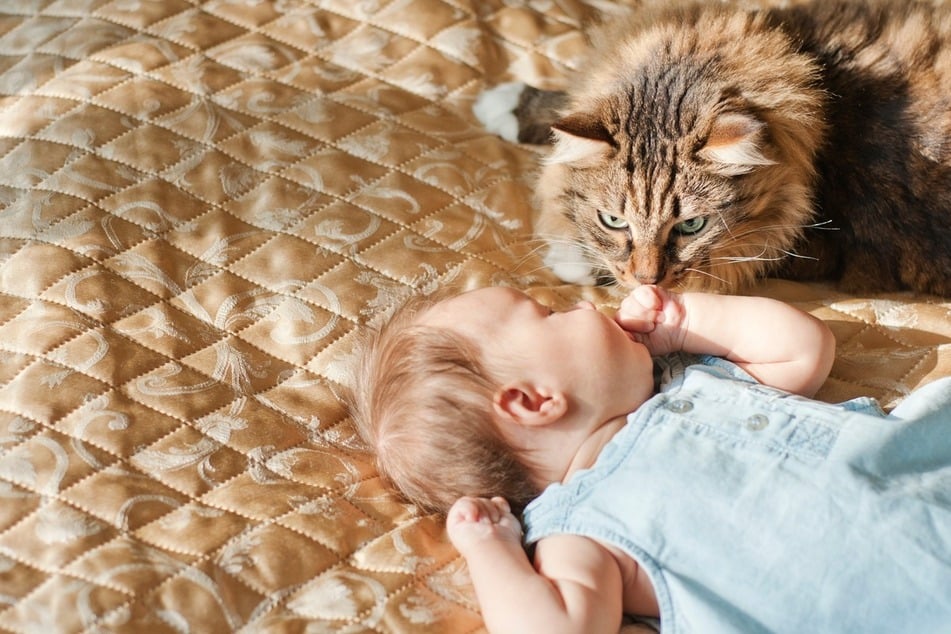
As a cat owner and a parent, the question of how to get the best of both worlds is a crucial one.
But is it even possible for cats and babies to co-exist, and what do you need to consider to make it work?
In this cat guide, TAG24 will take a look at cats and babies.
What are the dangers of cat ownership when you have a baby, what should you keep in mind, and how can you make sure that you all live together happily ever after?
Read on!
Dangers of cats and newborn babies
Let's get this out of the way first: babies and cats can definitely get along if you're aware of the dangers and keep everything well under control.
The knowledge factor is pretty important, though, because the dangers that cats pose to tiny little babies are more than just a little scratch-induced ouchie every now and again. There are nasty infections, dangerous parasites, and an assortment of other things to look out for.
Here are a few potential dangers that cats pose to newborn babies:
- Hygiene issues: Cats are pretty clean, as far as animals are concerned, but they're not spotless. In much the same way that you should wash your hands after you pet your kitty, you should make sure that your baby stays clean despite the cat.
- Allergies: People have cat allergies – and that, of course, includes babies.
- Cat litter: Risks associated with parasites and other nasty bugs are often related to your cat's excrement. As such, the baby should be kept far away from the litter tray, you should wash your hands after handling the stuff, and it should be emptied regularly.
- Surfaces: Make sure all surfaces that your baby comes in contact with in the first few months are properly sanitized and kept clean, especially if you have a cat.
- Feline disease: There are a number of parasites and diseases that can be transferred from cats to humans. For newborn babies, this is especially dangerous, so try to keep them away from the cat where possible.
- Scratches: On top of the obvious pain, and the risk of infection, cat scratches also pose another threat – cat scratch disease. This happens when bacteria are transferred via the bite or scratch, and can cause serious health problem.
- Accidents happen, even in love: If your cat and baby get along well, there's still a risk that accidents can happen. Kitties like to sleep on their humans, for example, and this is far from ideal if that human is a newborn baby.
Of course, babies also pose a few minor dangers to cats, especially once they can grab a hold of something – such as an errant tail!
Do cats suffocate babies?
In very rare cases, cats have been known to accidentally suffocate babies. This happens when the cat lies on top of the baby, covering its mouth and ears completely and stopping it from being able to breath. Think about it like a pillow pressed down on someone's face in a slasher flick, it can be lethal.
Don't worry, though, while cats aren't particularly smart, they will understand that the baby is a baby and will, as a result, generally be gentler and kinder towards your tiny human. Cats don't usually sleep on people's heads anyway, so the risk is relatively low that this could happen.
Is cat litter toxic to babies?
While it goes without saying that soiled cat litter can be very dangerous to a baby, it should also be made clear that the litter itself poses a risk. It is generally pretty safe, if your baby eats a handful then it'll probably get a stomach ache but be okay. If your baby eats more than that, though, it can be dangerous. It's another clear reason why you should keep babies away from cat litter!
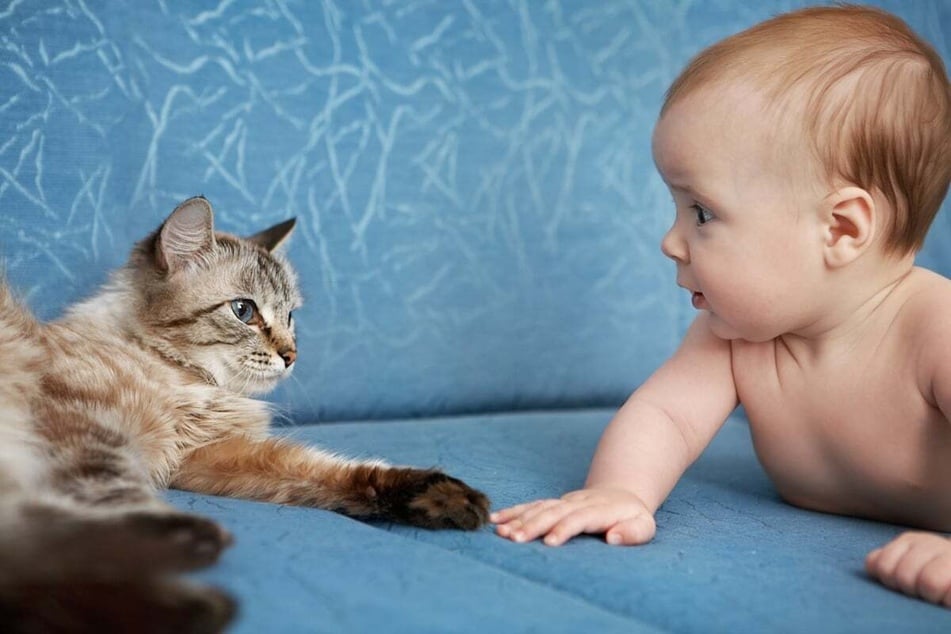
Is cat hair harmful for babies?
Other than the ever-present risk of allergies, cat fur is completely safe for your child. If your baby gets a bit of cat fur on it then nothing will be wrong and, to be honest, even if it consumes a bit from time to time by accident then you have nothing to worry about.
The problem comes, of course, if your baby starts eating handfuls of cat fur (bizarrely, this has been known to happen). While not deadly, it can cause some pretty bad blockages and require medical treatment. It's not surprising, of course, when you consider that cats have regular fur balls for this very reason.
Cat and toddlers dangers
All the risks that cats pose to babies also apply to toddlers, though many to a lesser extent. The real issue is that toddlers can be dangerous for cats. Once your child has entered the terrible twos it will have maximum mobility with minimum sense. That means lots of grabbing, lots of running, jumping, and biting.
To a cat, this can be a bit of a worrying and dangerous situation – after all, by the stage that the baby has become a toddler, it is quite likely a lot bigger than the cat and a lot heavier. This is when the risk shifts, and your child starts to be more of a danger to the cat than the other way around.
Here are a few of the risks toddlers pose to cats
- Extreme stress: Toddlers can be loud and wild, causing serious cat anxiety and a variety of other stressful symptoms. Your cat may become very unhappy and suspicious of the child. This can then manifest in increased aggression.
- Physical harm: Your toddler is liable to give your cat plenty of hugs, but won't understand that it is a delicate creature and can be hurt very easily. As a result, your toddler could easily hurt your cat with their over fondness and exuberance. It's out of love, but that doesn't remove the risk.
- Pulling and tugging: A lack of basic empathy and understanding in your toddler could result in a lot of tail pulling, ear flicking and pulling, and a habit of picking up the cat in potentially harmful ways.
- Smothering: It might be that your toddler loves to use your kitty as a pillow. Such a situation might be cute, but has the potential to be dangerous for your cat and cause smothering and difficulty breathing.
Keep your eye on your toddlers and babies at all times – it goes without saying! They can cause harm to themselves, and they can accidentally hurt your pets if supervision is not provided.
How to help cats and babies coexist
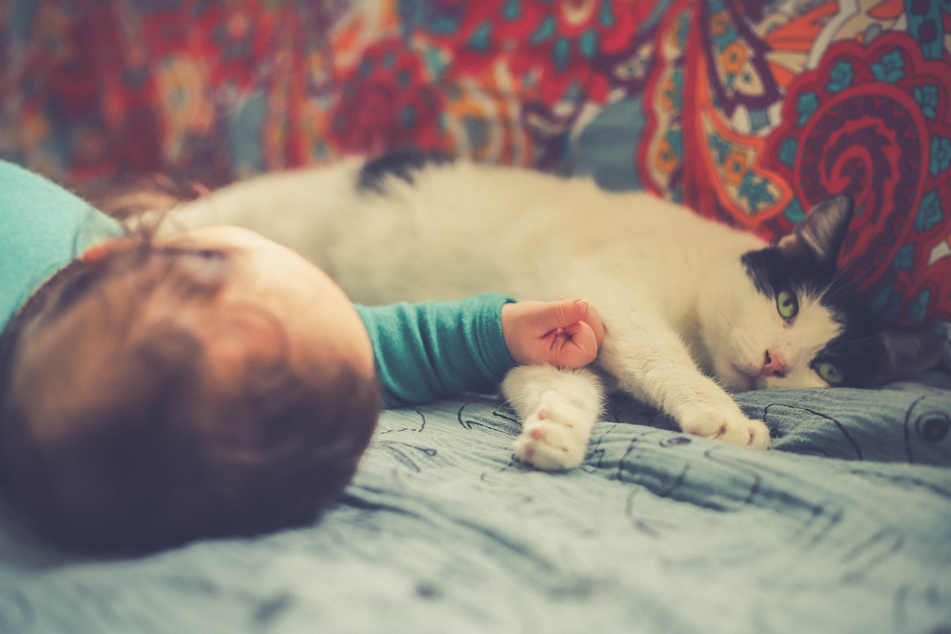
While all the discussed dangers do, indeed, exist, there is plenty that can be done to mitigate them and induce a healthy coexistence. The main ingredients are patience and common sense. Keep your kid out of potentially dangerous situations, and do the same for your cat: it really is that simple!
Here are a few steps to help your cat and baby coexist
- Let cats explore your baby's possessions: Before your baby arrives, let your cat sniff and explore all of your baby's new stuff: the crib, the toys, the blankets, everything! Let your cat get used to the new stuff.
- Play videos and sounds of crying babies to your cat: Again, before the kid arrives on the scene, play your cat the sound of babies crying to get it used to the noise.
- Put your cat's bowl and litter box out of the baby's reach: A lot of the dangers associated with cats come from its litter box. As a result, your baby should never come into contact with the box and it should be kept in a separate room. Additionally, after dealing with your cat's litter you should wash your hands thoroughly.
- Deworm your cat regularly: Worms can transfer to humans, so having your cat dewormed regularly is an important and useful step. It's best to also do the same for other parasites like fleas or mites.
- Do not neglect your cat because of the baby: It can be easy to forget about the needs of your cat when you have a baby, especially when it's a newborn. Try to avoid this where possible.
- Never leave your baby and cat unattended: This one is pretty obvious – never leave your baby and cat alone together! It's common sense, but you'd be surprised how commonly it happens.
- Give cats time to get to know the baby: Take time introducing the baby and cat, allowing your feline friend to get used to its new brother or sister. In the meantime, try to keep them separate where possible.
With these few simple steps you'll be able to easily own a cat and have a baby in the house at the same time. There are risks and there are solutions, you just need to be cautious.
Keep an eye on cats sleeping on babies
While cats and babies can be remarkably cute together, snoozing and cuddling up in tight balls. The problem, though, is that cats and babies are not particularly smart and could easily hurt one another if left unattended or sleeping on of top of each other.
Of course, the most likely thing to happen is that your cat will try to lie on top of your baby, so that's what you should look out for the most.
So try to never leave your child alone with the cat. It could end badly for either party, and is a risk that you should never take. While there will never be any malice or intend, accidents happen, and babies are very fragile.
Cover photo: 123rf/ahulilabutin
